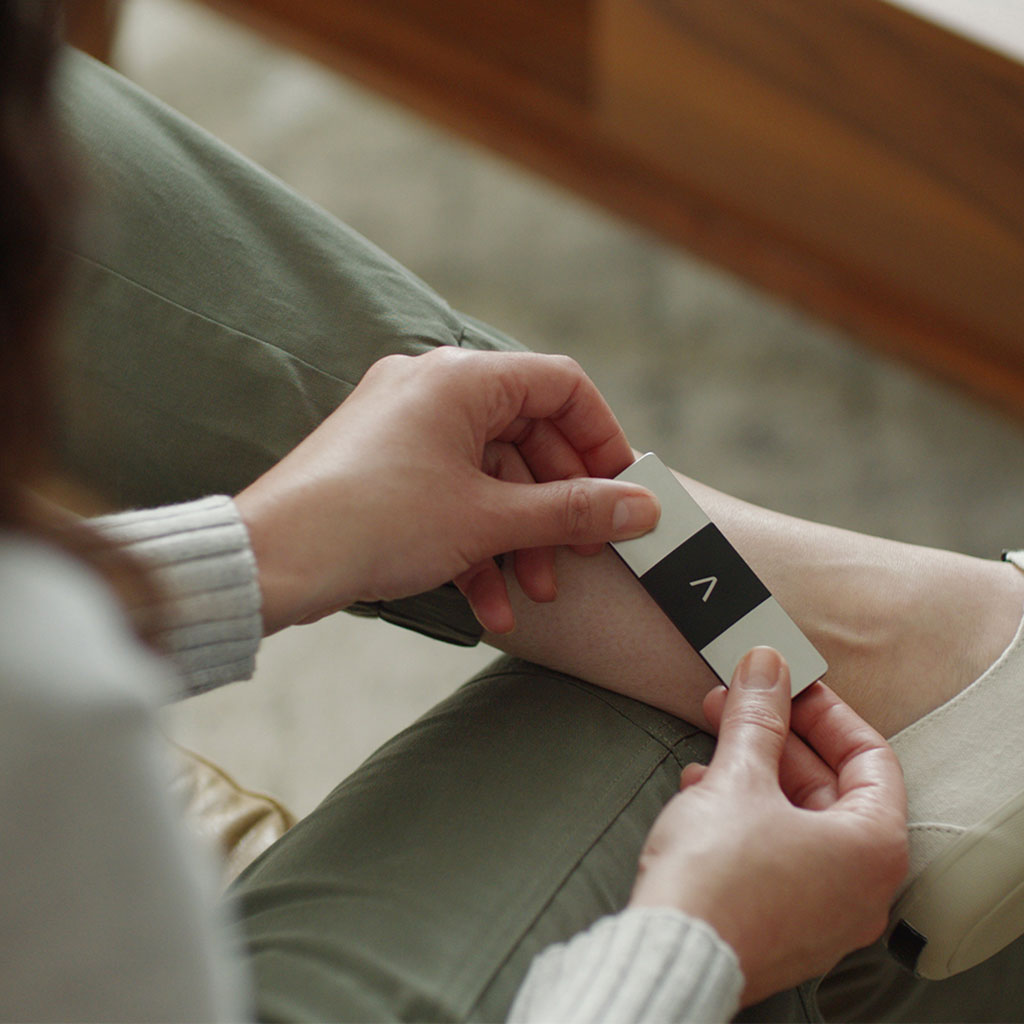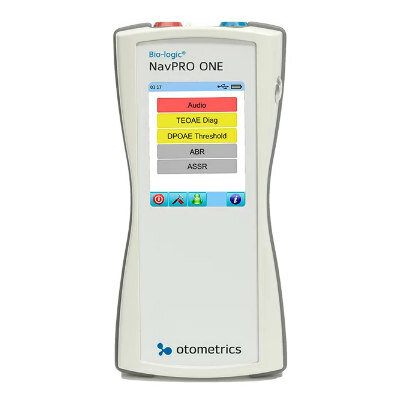Personal ECG Device Measures QTc Interval Prolongation 
|
By HospiMedica International staff writers Posted on 20 Jul 2021 |

Image: The KardiaMobile 6L in acquisition position (Photo courtesy of AliveCor)
A non-invasive, hand-held electrocardiogram (ECG) device allows manual QTc interval measurement, an important measure of pharmaceutical side effects.
The AliveCor (San Francisco, CA, USA) KardiaMobile 6L is a six-lead personal ECG device that can detect various arrhythmias by simulating the Einthoven Triangle, an ECG that is taken by placing leads on three limbs (both arms and a leg), thus placing the heart at the center. The result is six different perspectives that are equivalent to leads I, II, II, aVL, aVR, and aVF on a 12-lead ECG. In order to obtain an ECG, users place their thumbs on each of the top-side electrodes and place the bottom electrode on the left knee or the ankle.
Unlike most personal ECGs, such as smartwatches, the KardiaMobile 6L also records lead II data, which provides a far more accurate view of the QTc interval than the lead I view. The KardiaMobile 6L can thus detect atrial fibrillation (AF), bradycardia, tachycardia, QTc, and others measures over a period of just 30 seconds. In order to view the ECG, KardiaMobile 6L is paired via Bluetooth with a smartphone or tablet, and the data is sent to the Kardia app for instant analysis.
“Patient safety is paramount, and this is why we are proud to offer physicians the ability to monitor QTc through the convenience and quality of our device,” said Priya Abani, CEO of AliveCor. “Our aim is to help reduce the burden on our already strained healthcare system, so that clinicians can focus on treating patients. By delivering this service, we are doing just that.”
QTc is a heart rate corrected interval that reflects the integrity of the heart's electrical recharging system. Patients with a prolonged QTc are at greater risk for their hearts to go into a potentially dangerous arrhythmia called Torsades de Pointes, which can lead to sudden cardiac arrest (SCA). More commonly, QT prolongation is a potential side effect of more than 100 drugs, including certain antiarrhythmic medicines, cancer therapies, antifungals, antipsychotics, antidepressants, antibiotics, multiple sclerosis (MS) medications, and opioids.
Related Links:
AliveCor
The AliveCor (San Francisco, CA, USA) KardiaMobile 6L is a six-lead personal ECG device that can detect various arrhythmias by simulating the Einthoven Triangle, an ECG that is taken by placing leads on three limbs (both arms and a leg), thus placing the heart at the center. The result is six different perspectives that are equivalent to leads I, II, II, aVL, aVR, and aVF on a 12-lead ECG. In order to obtain an ECG, users place their thumbs on each of the top-side electrodes and place the bottom electrode on the left knee or the ankle.
Unlike most personal ECGs, such as smartwatches, the KardiaMobile 6L also records lead II data, which provides a far more accurate view of the QTc interval than the lead I view. The KardiaMobile 6L can thus detect atrial fibrillation (AF), bradycardia, tachycardia, QTc, and others measures over a period of just 30 seconds. In order to view the ECG, KardiaMobile 6L is paired via Bluetooth with a smartphone or tablet, and the data is sent to the Kardia app for instant analysis.
“Patient safety is paramount, and this is why we are proud to offer physicians the ability to monitor QTc through the convenience and quality of our device,” said Priya Abani, CEO of AliveCor. “Our aim is to help reduce the burden on our already strained healthcare system, so that clinicians can focus on treating patients. By delivering this service, we are doing just that.”
QTc is a heart rate corrected interval that reflects the integrity of the heart's electrical recharging system. Patients with a prolonged QTc are at greater risk for their hearts to go into a potentially dangerous arrhythmia called Torsades de Pointes, which can lead to sudden cardiac arrest (SCA). More commonly, QT prolongation is a potential side effect of more than 100 drugs, including certain antiarrhythmic medicines, cancer therapies, antifungals, antipsychotics, antidepressants, antibiotics, multiple sclerosis (MS) medications, and opioids.
Related Links:
AliveCor
Latest Critical Care News
- Novel Cannula Delivery System Enables Targeted Delivery of Imaging Agents and Drugs
- Ingestible Smart Capsule for Chemical Sensing in the Gut Moves Closer to Market
- Novel Intrabronchial Method Delivers Cell Therapies in Critically Ill Patients on External Lung Support
- Generative AI Technology Detects Heart Disease Earlier Than Conventional Methods
- Wearable Technology Predicts Cardiovascular Risk by Continuously Monitoring Heart Rate Recovery
- Wearable Health Monitoring Device Measures Gases Emitted from and Absorbed by Skin
- Groundbreaking Technology Rapidly Detects Airborne Influenza Viruses
- Handheld Device Could Transform Heart Disease Screening
- Flexible Semi-Autonomous Robot Could Deliver Medicine Inside Body

- Neurorestorative Treatment Strategies Hold Promise for Most Severe Forms of Epilepsy
- Gene Discovery Could Help Grow New Heart Arteries
- Study Discovers Invisible Transmission of Common Hospital-Associated Infection
- Non-Invasive Neuro-Ophthalmology Techniques Could Detect Brain Tumors Earlier
- Mass Manufactured Nanoparticles to Deliver Cancer Drugs Directly to Tumors
- World’s Smallest Pacemaker Fits Inside Syringe Tip

- AI-Powered, Internet-Connected Medical Devices to Revolutionize Healthcare, Finds Study
Channels
Surgical Techniques
view channel
Pioneering Sutureless Coronary Bypass Technology to Eliminate Open-Chest Procedures
In patients with coronary artery disease, certain blood vessels may be narrowed or blocked, requiring a stent or a bypass (also known as diversion) to restore blood flow to the heart. Bypass surgeries... Read more
Intravascular Imaging for Guiding Stent Implantation Ensures Safer Stenting Procedures
Patients diagnosed with coronary artery disease, which is caused by plaque accumulation within the arteries leading to chest pain, shortness of breath, and potential heart attacks, frequently undergo percutaneous... Read more
World's First AI Surgical Guidance Platform Allows Surgeons to Measure Success in Real-Time
Surgeons have always faced challenges in measuring their progress toward surgical goals during procedures. Traditionally, obtaining measurements required stepping out of the sterile environment to perform... Read morePatient Care
view channel
Portable Biosensor Platform to Reduce Hospital-Acquired Infections
Approximately 4 million patients in the European Union acquire healthcare-associated infections (HAIs) or nosocomial infections each year, with around 37,000 deaths directly resulting from these infections,... Read moreFirst-Of-Its-Kind Portable Germicidal Light Technology Disinfects High-Touch Clinical Surfaces in Seconds
Reducing healthcare-acquired infections (HAIs) remains a pressing issue within global healthcare systems. In the United States alone, 1.7 million patients contract HAIs annually, leading to approximately... Read more
Surgical Capacity Optimization Solution Helps Hospitals Boost OR Utilization
An innovative solution has the capability to transform surgical capacity utilization by targeting the root cause of surgical block time inefficiencies. Fujitsu Limited’s (Tokyo, Japan) Surgical Capacity... Read more
Game-Changing Innovation in Surgical Instrument Sterilization Significantly Improves OR Throughput
A groundbreaking innovation enables hospitals to significantly improve instrument processing time and throughput in operating rooms (ORs) and sterile processing departments. Turbett Surgical, Inc.... Read moreHealth IT
view channel
Printable Molecule-Selective Nanoparticles Enable Mass Production of Wearable Biosensors
The future of medicine is likely to focus on the personalization of healthcare—understanding exactly what an individual requires and delivering the appropriate combination of nutrients, metabolites, and... Read more
Smartwatches Could Detect Congestive Heart Failure
Diagnosing congestive heart failure (CHF) typically requires expensive and time-consuming imaging techniques like echocardiography, also known as cardiac ultrasound. Previously, detecting CHF by analyzing... Read moreBusiness
view channel
Expanded Collaboration to Transform OR Technology Through AI and Automation
The expansion of an existing collaboration between three leading companies aims to develop artificial intelligence (AI)-driven solutions for smart operating rooms with sophisticated monitoring and automation.... Read more
















